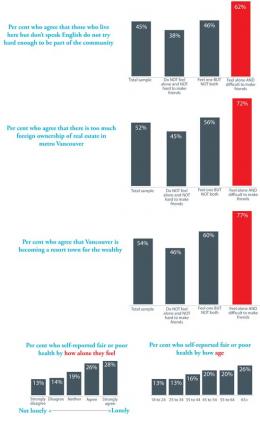Vancouver: United or Divided

Connections and Engagement: A Closer Look is a study by The Vancouver Foundation. Almost 4,000 people from our city participated in this study.
Vancouver Foundation’s survey found that metro Vancouver can be a challenging place to make new friends. One in three people say it is hard to make new friends here. And one in four say they are alone more often then they would like to be.
When we first released these findings, particularly the one about loneliness, a common reaction was, “This means 75 per cent of us are not lonely, so what’s the problem?” We learned it is a bit more complicated. First of all, only 52% say they don’t feel lonely, while 24% “neither agree or disagree” or “didn’t know” if they were alone more often than they wanted to be.
As well, the data gives us insight into the consequences of loneliness — for individuals and for the community. It turns out that feeling lonely is linked to a series of negative attitudes that could have an impact on the entire community.
Key findings
Those who are lonely or experience difficulty making new friends are much less trusting of others, feel less cohesion with their neighbours and are much less likely to feel a sense of connection to the broader community.
Attitudes toward community harden among the most isolated.
As a community, we would be concerned with a statistic that shows 25 per cent of our population suffering from any particular condition. Yet we tend to look at loneliness as inconsequential to anyone but the person feeling it. Our survey shows that loneliness has negative consequences for the entire community. When people feel lonely, they are also more likely to feel unwelcome in their neighbourhood and skeptical about community trust. As well, these residents are less likely to participate in activities that make their community a better place to live.
In other words, loneliness infects so many other aspects of a person’s approach to their community. We should not ignore these members of our community, and should look for ways to enhance their connection to other residents.
A hardening of attitudes
We began our analysis by looking at responses to these three statements:
People who live here and do not speak English simply do not try hard enough to be part of the community.
There is too much foreign ownership of real estate here.
Vancouver is becoming a resort town for the wealthy.
45 per cent of the total sample agreed with the first statement: that people who live here and do not speak English simply do not try hard enough to be part of the community.
We looked deeper into that sample and separated respondents into three groups:
People who do not feel alone and do not have difficulty making new friends.
People who may feel one but not both of those things.
People who feel alone and have difficulty making new friends.
The graph below shows that the people who feel the most isolated have a much more negative attitude toward other residents who do not speak English (62%).
We then analysed responses to the second statement: ‘There is too much foreign ownership of real estate here.’ Among the total sample, 52 per cent agree with the statement.
The graph below shows that the people who feel the most isolated have a much more negative attitude toward foreign ownership of real estate (72%).
Finally, we analysed responses to the third statement: ‘Vancouver is becoming a resort town for the wealthy.’ 54 per cent of the total sample agrees with the statement.
Once again, people who feel the most isolated have a significantly more negative attitude toward the affordability issue (77%).
A corrosion of neighbourhood trust
We also looked at how social isolation affects interactions with and attitudes towards neighbours. Across all measures, the people who say they are alone more often than they would like to be, are less connected, feel less welcome, and are more pessimistic about trust in the neighbourhood:
65 per cent of people who feel alone know the first names of at least two of their neighbours, compared with 80 per cent of people who do not feel alone.
65 per cent of people who feel alone feel welcome in their neighbourhood versus 81 per cent of people who do not feel alone.
45 per cent of people who feel alone think most people in their neighbourhood trust one another, whereas 62 per cent of people who do not feel alone think this.
56 per cent of people who feel alone think a neighbour would probably return a lost wallet compared with 72 per cent of people who do not feel alone.
Loneliness and poor health
There is a large body of research that links social isolation with poor health. Lonely people suffer more depression, heart disease, sleeping problems, high blood pressure and even an increased risk of dementia in older age. It is not only being alone that can cause poor health outcomes. It is the feeling of loneliness — that ‘alone in the crowd’ feeling that can affect health.
Our survey confirms the link between health and loneliness.
The lonelier people are, the lower they rate their health. These results hold even when controlled for disability and financial stress.
Note how the health of those who are alone more often than they want to be, trends the same way as the health of people as they age.
Leave a comment









